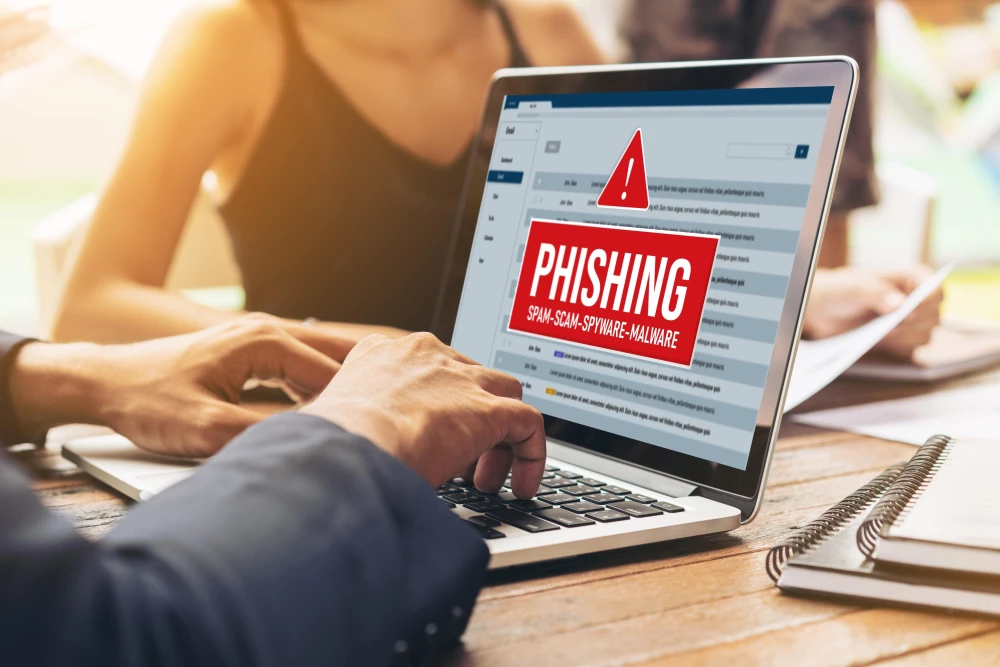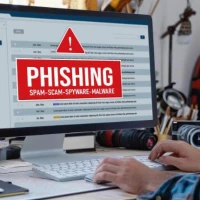
Phishing & Email Fraud
Get in touchAt Scam Claims, we help victims and across the UK who have been targeted by fraudsters posing as trusted organisations, companies, or individuals.
Phishing and email fraud are among the most common types of cybercrime, with criminals sending fake emails, texts, or links designed to trick people into revealing sensitive information or transferring money.
These scams lead not only to financial loss but also to identity theft and data breaches. Our solicitors provide specialist legal support to pursue compensation, challenge negligent institutions, and maximise the chances of recovering stolen funds.
Why Has Phishing & Email Fraud Become a Growing Problem?
Phishing scams occur when perpetrators impersonate banks, retailers, delivery companies, or government bodies in order to deceive victims. Victims are typically contacted by emails or text messages containing fake links, attachments, or login pages designed to steal passwords and account details.
Fraudsters often create a sense of urgency, warning of account suspension, missed deliveries, or unpaid bills.
How Much Money Do Victims Typically Lose to Phishing & Email Fraud in or Around ?
Losses from phishing and email fraud range lose about £765, with only 34% of funds recovered. Broader fraud data shows average losses of £1,730 per person, while UK businesses face phishing losses of around £1,600 per incident.
Contact Scam Claims to discuss your options for financial recovery.
Which Types of Phishing & Email Fraud Are Most Common Across ?
Fraud solicitors regularly deal with a wide range of phishing and email fraud cases, including:
Bank phishing emails – Fraudsters imitating banks to steal login details and authorise transfers.
Delivery scams – Fake emails and texts claiming missed parcels with links to payment pages.
Government impersonation – Messages pretending to be from HMRC, DVLA, or other authorities.
Corporate email compromise – Criminals hacking or imitating business email accounts to request payments.
Fake invoice emails – Fraudsters sending bogus bills or payment requests.
Malware attachments – Emails containing harmful files that install spyware or ransomware.
Payment fraud – Victims tricked into sending money via bank transfers or untraceable methods.
Can Victims Recover Funds Lost to Phishing & Email Fraud?
Victims who lost funds from phishing and email fraud may be able to recover money depending on the payment method and how quickly the scam is reported.
Payments made via credit card may be protected under Section 75 of the Consumer Credit Act, and some bank transfers may qualify for reimbursement under Authorised Push Payment (APP) fraud rules.
Even when fraudsters remain untraceable, legal claims and regulatory complaints against negligent institutions can significantly improve the chances of recovery.
How Do Lawyers Work With Banks and Regulators to Recover Funds?
Lawyers specialising in phishing and email fraud work closely with banks to trace fraudulent transactions, request freezes on suspicious accounts, and challenge refusals of reimbursement.
They also escalate claims to the Financial Ombudsman Service when banks deny responsibility. In addition, solicitors liaise with regulators such as the Payment Systems Regulator and Action Fraud to strengthen victims’ cases and improve accountability across institutions.
Are No Win, No Fee Options Available for Phishing & Email Fraud Claims?
Our phishing and email fraud solicitors offer no-win, no-fee arrangements, meaning clients only pay solicitor’s fees if compensation is successfully recovered.
Fees are usually taken as a percentage of the recovered amount, ensuring victims can access representation without worrying about upfront costs. This approach makes legal support accessible to those who have already suffered significant financial loss.
What’s the Process for Bringing a Phishing & Email Fraud Claim Forward in or Around ?
The process for working on a phishing and email fraud claim begins with an initial consultation, where victims provide evidence such as copies of fraudulent emails, payment records, and correspondence.
Solicitors then assess the case and determine whether funds can be reclaimed through banks, card providers, or civil claims. From there, they file claims, negotiate with financial institutions, and escalate to regulators or the court if necessary.
What Legal Support Do Fraud Solicitors Provide for Phishing Scam Cases?
Fraud solicitors provide a complete range of services to support phishing and email fraud victims, including:
Case assessment – Reviewing the strength of the claim and identifying recovery options.
Evidence collection – Gathering fraudulent emails, links, and transaction records.
Claims against banks – Pursuing negligent institutions that failed to protect customers.
Regulatory complaints – Filing complaints with the Financial Ombudsman Service or regulators.
Civil litigation – Taking direct legal action against fraudsters or associated parties.
Reporting support – Assisting victims with Action Fraud and police reports.
Do Solicitors Handle International Phishing & Email Fraud Cases?
Solicitors frequently handle international phishing and email fraud cases, as many originate from overseas criminal networks.
Recovery efforts often focus on UK-based banks and payment providers that processed the fraudulent transfers, but lawyers can also liaise with international regulators and financial institutions when necessary. This ensures that victims’ claims are pursued as widely and effectively as possible.
Contact Scam Claims today to find out how we can support your case.
Get in touch
Skip to
Gallery



